
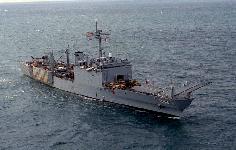
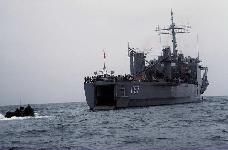
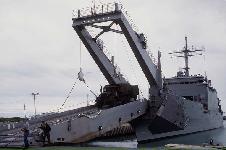
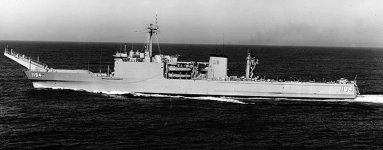



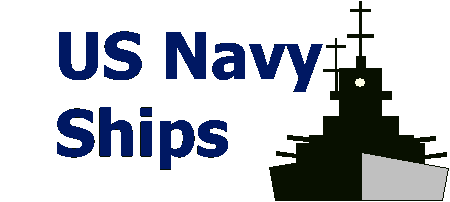
In 1993, as part of its Bottom-Up Review, the Department of Defense examined the amount of amphibious lift that would be required to fight two nearly simultaneous major regional conflicts. It concluded that the Navy should maintain enough lift to transport the personnel, aircraft, landing ships, vehicles, and supplies for 2.5 marine expeditionary brigades or MEB's.
In a legislative proposal dated April 15, 1994, the administration proposed the transfer of 15 Newport-class tank landing ships to a number of foreign countries. Two LST's would be sold to Australia; one LST would be provided on a grant basis to Morocco; two LST's would be leased to Spain; two LST's would be leased to Chile; one LST would be leased to Argentina; one LST would be leased to Brazil; two LST's would be leased to Venezuela; one LST would be leased to Malaysia; and three LST's would be leased to Taiwan.The 15 LST's in the administration proposal were among a total of 20 that were commissioned between 1969 and 1972. These ships constituted a significant part of the US amphibious shipping fleet as they transport tanks, other heavy vehicles, engineering equipment, and supplies. The LST's were relatively young in terms of their age and have impressive capabilities, as demonstrated by the interest of foreign navies in them. The administration's proposal to transfer 15 LST's to foreign countries would have reduced the amount of lift available to transport vehicles to only 73 percent of the 2.5 MEB goal in fiscal year 1994.
In response to the Congressional concern, the Navy proposed a new concept for maintaining 2.5 MEB's worth of vehicle space in the amphibious shipping fleet. In this concept two LST's were retained in a reserve status that would enable them to be available for active service in a few days. Four more LST's were stored in a nesting arrangement in which several months could be required to make them available for an emergency. The Navy's plan for these six LST's was intended to maintain the necessary amphibious lift capability. Subsequently the Congress in July 1994 authorized the five most pressing LST transfers for Australia, Brazil, Morocco, and Spain. In these cases, foreign crews were already training in the United States.
The two remaining ships of this class, USS Frederick (LST-1184) and USS La Moure County (LST-1194) are now assigned to the Naval Reserve Forces as the only remaining ships of this 20-ship class. These ships will serve with the Reserve until about 2004, when sufficient numbers of new LPD 17-class multi-purpose amphibious ships will be available bringing the Active forces back up to a 2.5 Marine Expeditionary Brigade lift capability. Naval Reserve Force Active (NRFA) ships have a reduced or skeletonized crew of active duty personnel assigned to provide training of assigned reservists for limited operations and maintenance. Under mobilization reservists assigned to a particular ship are activated, complementing the active duty personnel.The Frederick was transferred to the Naval Reserve Force in January 1995 and changed homeport to Pearl Harbor, HI. As the only amphibious ship in Pearl Harbor, she conducts bilateral exercises with South East Asian armed forces, continuous training exercises with the United States Marine Corps's and is on standby to conduct humanitarian assistance / disaster relief missions, throughout the Pacific.
The LaMoure County was participating in an annual maritime exercise called UNITAS -- Spanish for Unity -- when it grounded on rocks 12 September 2000, sustaining irreparable damage. The ship was maneuvering in a pre-dawn fog, preparing to off-load some of the 240 troops aboard, when the accident happened. The ship's hull scraped along a rocky bottom, opening up three forward compartments where fuel and Marines are housed. One hole measured 45 feet long. The Atlantic Fleet commander recommended that the ship be decommissioned, rather than repaired or towed back to the Little Creek Naval Amphibious Base. The ship is to be sunk during a gunnery exercise in 2001 during the annual UNITAS exercise.Specifications | |
| Displacement |
Light Displacement: 5190 tons Full Displacement: 8792 tons Dead Weight: 3602 tons |
| Length | Overall Length: 522 ft Waterline Length: 500 ft |
| Beam | Extreme Beam: 70 ft Waterline Beam: 70 ft |
| Draft |
Maximum Navigational Draft: 19 ft Draft Limit: 19 ft |
| Speed | 20 knots |
| Power Plant | Six diesels, 16,000 brake
horsepower, two shafts, Twin Controllable Pitch Screws BOW THRUSTER - Single Screw, Controllable Pitch |
| Armament | 4 - three-inch/50-caliber guns Phalanx close-in weapons systems to be fitted |
| VEHICLE STOWAGE | 19,000 Square Feet
(1,767 Square Meters) lift capacity includes 29 tanks |
| Complement | ship's company -- 14 Officers, 210 Enlisted 360-400 troops |
| Unit Operating Cost Annual Average | $12,500,000 [source: [FY1996 VAMOSC] |
Ships | ||||||
| Name | Number | Builder | Homeport | Ordered | Commissioned | Decommissioned |
| Newport | LST-1179 | PNSY | Little Creek | 29 Dec 1964 | 07 Jun 1969 | 01 Oct 1992 |
| Manitowac | LST-1180 | PNSY | Little Creek | 29 Dec 1965 | 24 Jan 1970 | 30 Jun 1993 |
| Sumter | LST-1181 | PNSY | Little Creek | 29 Dec 1965 | 20 Jun 1970 | 30 Sep 1993 |
| Fresno | LST-1182 | NASSCO | San Diego | 15 Jul 1966 | 22 Nov 1969 | 08 Apr 1993 |
| Peoria | LST-1183 | NASSCO | San Diego | 15 Jul 1966 | 21 Feb 1970 | 28 Jan 1994 |
| Frederick | LST-1184 | NASSCO | Pearl Harbor | 15 Jul 1966 | 11 Apr 1970 | 2004 |
| Schenectady | LST-1185 | NASSCO | San Diego | 15 Jul 1966 | 13 Jun 1970 | 15 Dec 1993 |
| Cayuga | LST-1186 | NASSCO | San Diego | 15 Jul 1966 | 08 Aug 1970 | 26 Aug 1994 |
| Tuscaloosa | LST-1187 | NASSCO | San Diego | 15 Jul 1966 | 24 Oct 1970 | 18 Feb 1994 |
| Saginaw | LST-1188 | NASSCO | San Diego | 15 Jul 1966 | 23 Jan 1971 | 28 Jun 1994 |
| San Bernardino | LST-1189 | NASSCO | San Diego | 15 Jul 1966 | 27 Mar 1971 | 30 Sep 1995 |
| Boulder County | LST-1190 | NASSCO | Little Creek | 15 Jul 1966 | 04 Jun 1971 | 28 Feb 1994 |
| Racine | LST-1191 | NASSCO | Long Beach | 15 Jul 1966 | 09 Jul 1971 | 02 Oct 1993 |
| Spartanburg County | LST-1192 | NASSCO | Little Creek | 15 Jul 1966 | 01 Sep 1971 | 16 Dec 1994 |
| Fairfax County | LST-1193 | NASSCO | Little Creek | 15 Jul 1966 | 16 Oct 1971 | 17 Aug 1994 |
| La Moure County | LST-1194 | NASSCO | Little Creek | 15 Jul 1966 | 18 Dec 1971 | 2004 |
| Barbour County | LST-1195 | NASSCO | San Diego | 15 Jul 1966 | 12 Feb 1972 | 30 Mar 1992 |
| Harlan County | LST-1196 | NASSCO | Little Creek | 15 Jul 1966 | 08 Apr 1972 | 14 Apr 1995 |
| Barnstable County | LST-1197 | NASSCO | Little Creek | 15 Jul 1966 | 27 May 1972 | 29 Jun 1994 |
| Bristol County | LST-1198 | NASSCO | San Diego | 15 Jul 1966 | 05 Aug 1972 | 29 Jul 1994 |




